
Concept
RP-IO Module Device Installation
The RP-IO module can be installed on a DIN rail or other flat surface inside a cabinet. The device is recommended to be installed in a cabinet, unless local regulations allow an exception.
Installation orientations
Under normal operating conditions of 0 to 50 °C (32 to 122 °F), the RP-IO module can be installed in the following orientations:
Horizontally (on a DIN rail going from left to right), with the device label text in the upright position reading left to right. See “a” in the following figure.
Vertically (on a DIN rail going from top to bottom), which means that the device is rotated +90 degrees or -90 degrees from the horizontal position. See “b” and “c” in the following figure.
Face down from a ceiling. See “d” in the following figure.
Up and down, which means that the device is rotated 180 degrees from the horizontal position and with the device label text up and down. See “e” in the following figure.
Face up on a horizontal surface. See “f” in the following figure.

Installation on a DIN rail
A DIN rail is a common and convenient technique for installing the RP-IO module along with other associated control and monitoring devices. The most efficient ventilation is achieved with the wall-mounted DIN rail oriented horizontally and with adequate space provided between the RP-IO rail and adjacent rails or other devices.
The RP-IO module is typically installed horizontally (on a DIN rail going from left to right), with the device label text in the upright position reading left to right.
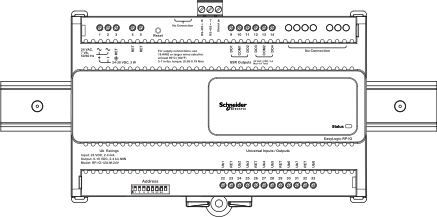
To help prevent the device from sliding down or sideways on the DIN rail, install an end clip for DIN 35 (part number SXWDINEND10001) tightly against the bottom or rightmost device on the rail. The end clip is easily removed if you bend the snap lock open with a screwdriver.
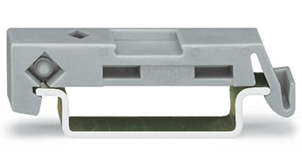
Installation in a cabinet
All RP-IO module models are recommended to be installed in a cabinet, unless local regulations allow an exception.
The device should be installed within an enclosure such as a control cabinet for isolation to exposed live parts.
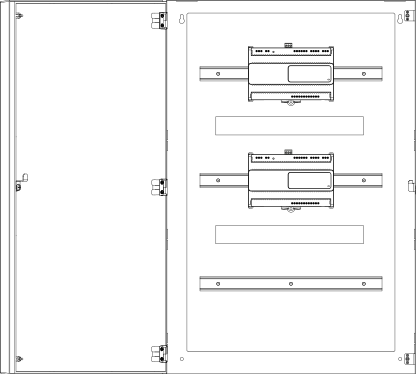
When installing RP-IO modules in a cabinet, it is recommended to provide ample space between the DIN rails and modules for sufficient ventilation.
Screw terminals
The RP-IO modules have fixed screw terminals. For more information, see RP-IO Screw Terminals .
Anchor points for cable ties
The RP-IO modules have four anchor points that can be used to fasten cable ties or other accessories for bundling wires.
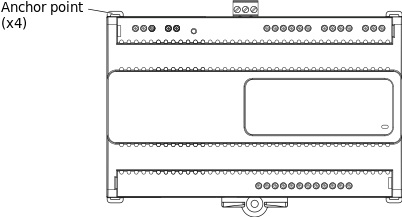
Optional covers
The RP-IO modules can be equipped with optional covers to reduce access to the screw terminals and wires if desired.
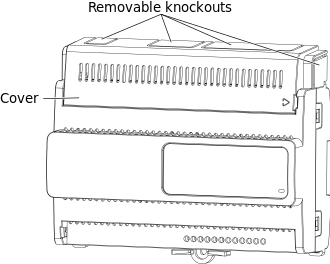
 Hardware Overview
Hardware Overview
 RP-IO Modules
RP-IO Modules
 RP-IO Models
RP-IO Models
 Installing an RP-IO Module on a DIN Rail
Installing an RP-IO Module on a DIN Rail
 Installing an RP-IO Module on a Flat Surface
Installing an RP-IO Module on a Flat Surface
 RP-IO Screw Terminals
RP-IO Screw Terminals
 Wiring a Screw Terminal on an RP-IO Module
Wiring a Screw Terminal on an RP-IO Module
 Powering Up an RP-IO Module
Powering Up an RP-IO Module
 Installing the Optional Covers on the RP-C or RP-IO
Installing the Optional Covers on the RP-C or RP-IO
 Removing an Optional Cover from the RP-C or RP-IO
Removing an Optional Cover from the RP-C or RP-IO
 RP-C Regulatory Compliance and Approvals
RP-C Regulatory Compliance and Approvals